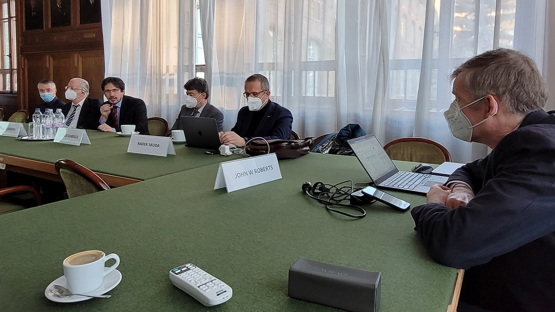The IAEA has completed its first curriculum review of a university degree programme with a nuclear specialization. The four-day visit to the Budapest University of Technology and Economics (BME) in Hungary aimed to support further development of the programme by identifying potential new resources and sharing good practices.
The review of BME’s undergraduate and postgraduate programmes in physics, energy engineering and the master’s programme in medical physics was led by John Roberts, an IAEA Knowledge Management Specialist as part of the Agency’s Knowledge Management Assist Visit (KMAV) service. He was accompanied by Robin Grimes, Professor of Energy Materials at Imperial College London in the United Kingdom and Radek Skoda, Professor of Electric Power Engineering at the University of West Bohemia in the Czech Republic.
The KMAV service is a peer review designed to assist countries in maintaining and preserving knowledge in nuclear organizations. Education and training organizations can use the service on three levels, depending on the status of their nuclear or radiological education and training programmes. Level 3 KMAVs, for the most advanced programmes such as BME’s, can provide specific assistance to optimise and enhance programmes to ensure their sustainability, and are also used to record good practices which are then used as reference in Level 1 and 2 KMAVs.
BME’s Institute of Nuclear Techniques (NTI) has provided training since the launch of Hungary’s nuclear energy programme in the 1970s. Hungary currently generates almost half of its electricity from four nuclear power reactors with a total capacity of 1900 MWe and plans to construct new reactors to meet its energy needs.
“With Hungary’s long-term commitment to use nuclear energy for the production of low carbon electricity, the importance of high-quality education in the nuclear field is continuously increasing,” said Attila Aszodi, Dean of the Faculty of Natural Sciences. “BME will see the benefits of this visit for many years to come.”
During the visit, which took place from 14 to 17 December, the KMAV team spoke with the university’s senior management, staff and students and visited the laboratories and research reactor. The experts confirmed that BME has robust nuclear degree programmes producing highly qualified BSc and MSc graduates with an excellent breadth and depth of knowledge. The possibility to access a training reactor is a tremendous advantage to the students and the degree programmes benefit from being closely aligned with the current and future needs of the Hungarian nuclear industry.
As this was the first such mission, BME helped the IAEA by providing feedback on the content and format of the information requested prior to the visit, which together with an effective mission agenda optimised the time available for the visit.
“We are very grateful to BME for hosting this first of a kind peer review and providing valuable feedback that will be incorporated in planning and conducting future missions of this kind,” said Roberts. “KMAVs can help universities optimise their programme delivery and content based on best practices collected from universities such as BME.”
Through its KMAV service, the IAEA will be working with other universities with well-established nuclear and radiological education programmes, as well as universities wishing to establish such programmes.
Universities that would like to host a KMAV are invited to send an email.



